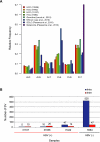The effects of hepatitis B virus integration into the genomes of hepatocellular carcinoma patients
- PMID: 22267523
- PMCID: PMC3317142
- DOI: 10.1101/gr.133926.111
The effects of hepatitis B virus integration into the genomes of hepatocellular carcinoma patients
Abstract
Hepatitis B virus (HBV) infection is a leading risk factor for hepatocellular carcinoma (HCC). HBV integration into the host genome has been reported, but its scale, impact and contribution to HCC development is not clear. Here, we sequenced the tumor and nontumor genomes (>80× coverage) and transcriptomes of four HCC patients and identified 255 HBV integration sites. Increased sequencing to 240× coverage revealed a proportionally higher number of integration sites. Clonal expansion of HBV-integrated hepatocytes was found specifically in tumor samples. We observe a diverse collection of genomic perturbations near viral integration sites, including direct gene disruption, viral promoter-driven human transcription, viral-human transcript fusion, and DNA copy number alteration. Thus, we report the most comprehensive characterization of HBV integration in hepatocellular carcinoma patients. Such widespread random viral integration will likely increase carcinogenic opportunities in HBV-infected individuals.
Figures






References
-
- Baeza N, Masuoka J, Kleihues P, Ohgaki H 2003. AXIN1 mutations but not deletions in cerebellar medulloblastomas. Oncogene 22: 632–636 - PubMed
-
- Block TM, Mehta AS, Fimmel CJ, Jordan R 2003. Molecular viral oncology of hepatocellular carcinoma. Oncogene 22: 5093–5107 - PubMed
-
- Bréchot C, Gozuacik D, Murakami Y, Paterlini-Bréchot P 2000. Molecular bases for the development of hepatitis B virus (HBV)-related hepatocellular carcinoma (HCC). Semin Cancer Biol 10: 211–231 - PubMed
MeSH terms
Associated data
- Actions
LinkOut - more resources
Full Text Sources
Other Literature Sources
Medical
Molecular Biology Databases
